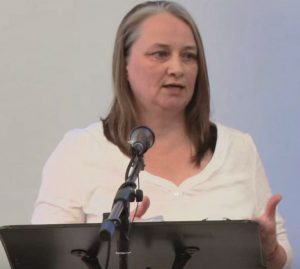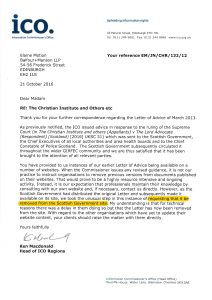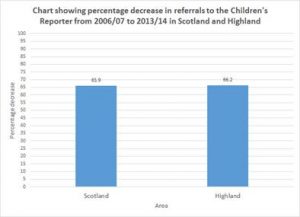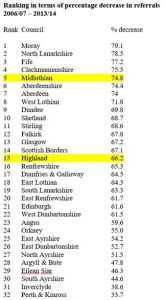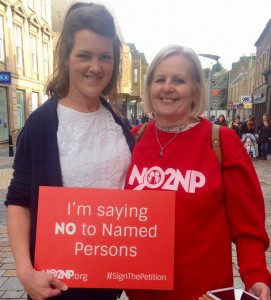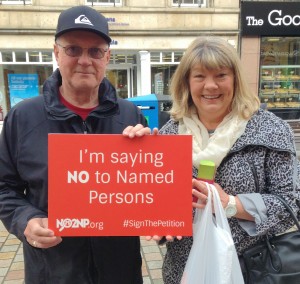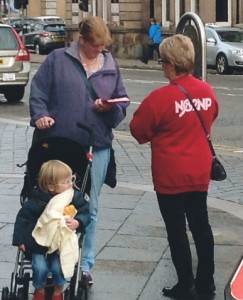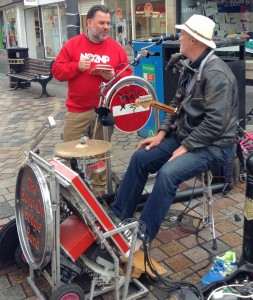Blog
Keeping you up to date on the progress of the Named Person scheme and the NO2NP campaign.
Highland Named Person an opponent, actually, of families
Posted 9 years agoGIRFEC has been running in parts of Highland for ten years and has been fully implemented across the whole region for seven years. The Named Person scheme was trialled in parts of Highland in 2008 and has been fully operational across the region for 6 years. Bill Alexander, Director of Care and Learning at Highland Council and main proponent of the ‘Named Person scheme’ claims it has been operating effectively over this time, cutting down on bureaucracy and empowering health visitors and teachers.
Aileen Campbell, former Minister for Children & Young People, fierce proponent and champion of both GIRFEC and the Named Person scheme stated that:
“The [Children and Young People] bill mentions no specific conditions because our approach in Scotland is, Getting It Right For Every Child (GIRFEC) and the E is to stand for each and every child in Scotland and to ensure support is there for them”.
This response protests the uniqueness of ‘each’ child in Scotland, whilst simultaneously defending the refusal to address specific needs of individual children. By subsuming each individual child without exception under the group identity of ‘every child’ within the universal grasp of GIRFEC, help, it is claimed, will be forthcoming. So rather than ensuring that specific unmet needs of each child are addressed through rigorous assessment on an individual basis, GIRFEC imposes a standard mandatory checklist assessment for every child. GIRFEC is about common goals, that neither the children nor their parents have any influence over setting. Its stated aim is to produce successful learners, confident individuals, effective contributors and responsible citizens; but only insofar as can be achieved within the confines of the state approved wellbeing outcomes that form the basis of the GIRFEC approach and the Named Person legislation.
Autistic boy denied support
And it is only when you talk to individual families of children with specific individual needs that the true scale of the failure of GIRFEC and Named Person to meet those needs is revealed in all its tragic damaging reality.
At a primary school within the GIRFEC & Named Person trial area in Highland, a young autistic boy had his personal support worker removed without notification, consultation or any preparation. The parents only became aware of this situation when they saw a ‘Thank-you’ note to her in the school newsletter. On further enquiry the parents were told by the head teacher that no allowance had been made for support staff for their son in the school budget. The head teacher claimed he had not been made aware that the child would require any, despite the fact that the child had had this support worker for the previous two academic sessions. As well as autism, the boy was also diagnosed with Developmental Co-Ordination Disorder but was not given a Co-ordinated Supported Plan and his Individualised Educational Programme was discontinued without consultation with the parents. Added to this he had no identified ‘time-out’ space and indicated feelings of isolation and stress to his parents.
The removal of his support caused the young child to almost immediately experience problems over dressing, concentration, social language, playground bullying and loss of confidence. The family finally removed their son and his siblings from the school over fears for their safety. The children were referred to the Children’s Reporter three times for non-attendance at school, none of which were progressed. Indeed the home education the parents provided for their children resulted in them receiving UK educational awards. The media covered one of the children receiving their UK award the week before Mr Bill Alexander, Director of Care and Learning at Highland Council again referred them to the Reporter for non-attendance at school.
9-year-old attempts suicide
At the same primary school, an HMI report in April 2009 -3 years in to GIRFEC and 1 year in to the Named Person trial – states that “Children behave well in classes and around the school. Most are confident that the school will deal effectively with any incidents of bullying. Children feel safe and valued in school …” Yet only a few months prior to this report a 9 year old girl had to be accommodated at another primary school due to an inability by this school to resolve a serious bullying regime against her. The bullying was so bad that the young girl had tried to strangle herself on school premises in front of her classmates, some of whom were egging her on with chants of “Go Brooke, Go” as she wound her school tie around her neck. It was the chanting of the other pupils that had alerted staff to what was going on; the girl’s mum was told her child’s lips were blue when staff arrived on the scene.
Her mother kept her off school for a few days after the incident, and she was given a support worker who the family report was more interested in asking about home life than the bullying. After returning to school for the autumn term in 2008 the bullying started again and her mum removed her for her own safety. The Highland Council found her a place at another school but told the single mum who was on benefits and a carer for her own father that she would have to pay the transport costs.
Teacher Named Person dismisses medical diagnosis
Other examples from the Inverness GIRFEC / Named Person trial area include one mum who had approached her son’s school with concerns around his behaviour. She voiced worries that he may have autism but was told her son’s behaviour was down to her poor parenting; she was told she was too strict and then not strict enough and became frightened to parent. The boy was referred to Child Adolescent Mental Health Services (CAMHS) who diagnosed anxiety personality and attachment disorder. However, the mum, and others who knew the boy and had experience of autism, felt he should be properly assessed; social work warned the mum off the autism route.
Taking matters in to her own hands, the mum independently contacted a group in Edinburgh and paid privately for an Autism Diagnostic Observation Schedule (ADOS) assessment. This suggested autism but the mum was told that she would need to get the diagnosis confirmed by NHS Highland in order to have services guaranteed. Social work’s response to the ADOS assessment was ‘if you pay for something, you will get what you pay for’ while the boy’s guidance teacher (his Named Person although no one had explained this role to the family) said that it was’ not worth the paper it was written on’.
Referrals were made to the Children’s Reporter due to non-attendance at school. In fact the child was a non-attender because of being the victim of bullying over a prolonged period of time by boys in the area where he lived which had left him unable to cope and stopped him leaving the house. None of this had been addressed by ‘services’. The family were referred to the Children’s Panel on more than one occasion but at the final hearing events were leading towards the removal of the boy to a placement in another authority for children who were school refusers. His autism was never taken in to account in any discussions and it was only through the involvement of the GP that NHS Highland finally undertook their own assessment which confirmed the private ADOS diagnosis of autism. The mother truly feels that, given her son’s suicidal tendencies, if he had been removed to an out of authority placement for school refusers he would not be alive today. The mum said that it felt like it was all the professionals arrayed against them; that the professionals stuck together while the parent was viewed as ‘the enemy’.
‘Atrocious’ child plan
Another child in the Inverness trial area with behavioural problems has waited ten years to get a proper assessment and diagnosis that would enable him to access the appropriate support services. He turns 16 in January still waiting and his mother fears that then, as an adult, he will simply be left for the criminal justice system to deal with as his actions have now brought him in to contact with the police.
The mum just wants answers but reports failure after failure of services to, not only properly assesses her son’s needs in the first place, but to provide any sort of support at all to him in the ten years since GIRFEC began. Despite this taking place within the GIRFEC/Named Person trial area, it was the mother who had to take the head teacher to the Education Board before they would fully accept and understand their duties and responsibilities. She describes the Child’s Plan as ‘atrocious’ with factual errors frequently occurring yet no capacity or opportunity for her to correct them. She has been handed a new Child’s Plan one hour before a meeting; never received a copy of another version; had one Child’s Plan record her son’s attendance at school as 83% – only to have that revised to 12% when the mum queried it. The boy was accommodated in June of this year when he was deemed too high risk to return home after taking an overdose and becoming violent. The police restrained, handcuffed and took the 15 year old away in a caged police van. Two hours later a social worker came to the home and asked the traumatised mum, who was offered no support, to sign the papers to put him in to care. The boy was sent home when bed numbers were cut from seven to five – the mum called social work this week pleading with them to accommodate her son after more violent outbursts, but to no avail. The Mum describes her and her son’s experience as ‘absolutely horrendous’.
This mother has been outspoken in her efforts to access support for her son, something she believes has been held against her by services. But the boy’s situation has continued to decline through the failure of services over a period of years while his actions have escalated to the point where the Police and social work have become involved. But the Police response is to ask ‘what is social work doing’, while social work say ‘call the police’. The family has never been referred to the Reporter with one social worker proclaiming ‘it’s not going to the Children’s Reporter because I’m involved now.’ The son’s social worker is leaving at the start of December but the Council has no plans to replace that person, again leaving the mother to cope on her own, even when her own health is suffering serious decline as a result of what this family has been put through whilst Highland’s roll-out of Getting It Right For Every Child receives nothing but praise.
Highland cuts
Policies have changed in Highland with the claim that this has resulted in an apparent improvement in one of the metrics used to monitor problems in childhood – referrals to the Children’s Reporter. This improving statistic has been used as evidence for the success of GIRFEC and Named persons but the truth is, in many cases, quite the reverse. Rather than problems being resolved by early intervention problems are instead ignored or denied.
In early 2009, a couple of months before Highland authorities and the Scottish Government were celebrating the full roll-out of GIRFEC across the whole region, Andrew Stewart the Highland Secretary of the EIS (Educational Institute for Scotland) told the Inverness Courier that:
“The additional support budget has been cut back year-on-year. It is the most vulnerable members of the school community that are being short-changed.”3
Mr Stewart added that ‘cuts mean staff are struggling to provide the appropriate level of support.’3 The EIS even went as far as to say that ‘the situation had deteriorated so much that the [Highland] council is no longer meeting its own inclusion policy’. The Highland ADHD Support Group noted at this time that:
“If schools lack an extra member of staff to provide support in the classroom and playground, children with additional support needs are going to feel the impact.”
They were commenting around the specific case of a six year old boy again in the Inverness area who had, at this point, been excluded from school for four months because the authority could not provide an appropriate educational environment; this was in an area that had, at that time, been ‘Getting It Right For Every Child’ for over three years and had Named Persons for over a year.
Named Person secrecy
Young adults, who recently left a large secondary school in the Named Person trial area, say that neither they nor their friends ever heard of it at school; no-one told them about it, no-one introduced themselves as their ‘Named Person’. Yet, this is meant to be a service that operates as their single point of contact, someone that all children, young people and their families know to go to in order to access the services and support they need. How can they ask them for help if they do not even know they exist, 8 years after they were introduced?
The secrecy that has surrounded the Named Person in Highland has completely undermined any claim that it has been a successful first point of contact which has, let us not forget, been the only reason given for the scheme which is in any way acceptable to parents.
Without any public profile for the service and without parents and children being aware of its existence, its operation must have perforce been related to gathering and sharing information from parties out with the family concerning children and their parents. Thus the phrase ‘state snooper’ – so often derided by Bill Alexander and his cohort – is left as the only reasonable description of the Highland Pathfinder trial.
In all of the accounts collected, there has not been one single case where the Named Person has been an ally of, or advocate for, the child and family but only one more foot soldier in a shield-wall of professionals barring access to help that has been promised to, and paid for by, the people and families of Highland.
The ‘Named Person’ scheme has also been progressed by government behind a veil of secrecy utilising grossly over-stated and under-evidenced claims of success which have allowed the Highland authorities collective amnesia over appalling experiences of families under this pernicious drive to enshrine ‘a happy childhood’ in statutory legislation.
Lesley Scott, Northern Exposure, community based investigative journalism.
Lesley Scott is also Scottish Officer for the charity Tymes Trust
Out-of-date ICO data-sharing advice assigned to the dustbin
Posted 9 years agoLike out-of-date milk was the Information Commissioner’s 2013 data-sharing advice to public bodies following the Supreme Court ruling in July.
The guidance was well and truly past its sell-by date. But yet it continued to remain on the shelf.
In 2013 Ken Macdonald the Information Commissioner issued a letter to public bodies giving guidance about data-sharing practices in relation to the Children and Young People (Scotland) Act, which had just passed through the Scottish Parliament.
On the assumption that the Act would come into force new advice was issued. This became the go-to guidance for public bodies on how state officials should share confidential information.
But in July when the UK Supreme Court struck down the data-sharing provisions in Part 4 of the Act, an alarm was raised about the now legally inaccurate advice, and whether or not local authorities had been sharing data unlawfully as a result.
The Information Commissioner issued updated advice in response to the ruling, but did not withdraw the legally inaccurate 2013 letter until pressured to do so.
Those involved in the NO2NP campaign wrote to Head of ICO Regions, Ken Macdonald, raising concerns. The Information Commissioner eventually conceded and asked the Scottish Government to remove the inaccurate advice from its website.
Simon Calvert, NO2NP spokesman, commented:
“This was clearly legally inaccurate advice given the outcome of the court case. It further demonstrates how the public sector is having to rein in its policies and practices in light of the Supreme Court victory.”
He added: “The difference in content and tone could not be clearer. A key plank to the named person scheme was the scattergun approach to sharing data on families.
“Who knows how many mums and dads and children have already been subject to the implementation of the inaccurate advice previously given out?
“We ourselves have been contacted by numerous families who have uncovered intimate personal information about them being passed between agencies through making subject access requests for information which is held on them by public bodies.
“They are rightly furious and some are considering their legal remedies.”
If you think confidential information about you or your family could have been shared unlawfully, do consider making a Subject Access Request. Find out more here.
If the reply to your Subject Access Request discloses information which alarms you and you think it may help the campaign against Named Persons, contact us by emailing: stories@no2np.org
We understand any information you share with us may be extremely sensitive and will be treated confidentially. We won’t use any information without your explicit consent.
The facts behind Swinney’s Highland Council ‘utopian’ claims
Posted 9 years agoUtopia: “an imagined place or state of things in which everything is perfect.”
You would perhaps expect to see ‘utopian’ ideals populating the pages of fiction, but not perhaps on the floor of the Holyrood chamber or in front of a Parliamentary Committee. But when it comes to the Named Person scheme, the normal rules don’t apply.
Highland Council is often wheeled out by proponents of the Named Person scheme as Scotland’s utopian ideal. It’s frequently used as ‘evidence’ of the scheme’s success, and the reason for a nationwide roll-out. And this time it was Deputy First Minister John Swinney’s turn to spin the wheel.
In front of not only the Holyrood chamber but again in the Education and Skills committee, Mr Swinney confidently stated some impressive sounding stats about a drop in referrals to the Children’s Reporter in Highland.
Predictably, he attributed the success to Highland’s Named Person pilot scheme.
But as the saying goes… the devil’s in the detail.
You may be surprised to learn that Mr Swinney’s stats did not paint the whole picture.
What he didn’t tell you was that in the same time period there was a drop in referrals across Scotland. In fact many local authorities which did not have a Named Person pilot scheme saw an even higher percentage drop in referrals.
Highland was not even close to being an isolated case study.
Highland’s figures were only mid-range in comparison to the rest of Scotland.
There is therefore no evidence to suggest a link to the Named Person pilot scheme.
It’s time to wake up from the utopian dream and face reality: Highland is not the model and inspiration for the national Named Person scheme that Mr Swinney and others would like us to believe.
NO2NP ACTION DAY – INVERNESS
Posted 10 years agoNO2NP volunteers took to the streets of Inverness on Saturday to find out what local people thought of the much vaunted Highlands Named Person pilot scheme.
The team found that many people were completely unaware of the scheme and when they were told what it would entail, they couldn’t sign the online petition against it fast enough!
Others already knew about the Named Person and needed no convincing that it was a bad thing. One couple thanked the team for taking a public stand on the matter, while others said they would be letting their grown up sons and daughters know, so they could sign the petition too.
As a result of the Inverness Action Day, hundreds of flyers were given out and our online petition has now passed 14,000 signatures. Thank you to all the volunteers who have taken part in an Action Day so far. There will be many more opportunities coming up so keep a look out for events in your area.
NO2NP volunteers across Scotland have also been posting thousands of leaflets through letter boxes and spreading the word about the Named Person scheme in local areas. If you would like to get involved in the campaign by doing some door-to-door leafleting or visiting local parent groups with leaflets email volunteers@no2np.org to request copies.
Highland Council Accused of “Big Brother” Tactics
Posted 12 years agoHighland Council has been criticised for introducing “state guardians” for all children in the region ahead of a legal battle against the controversial scheme.
Campaigners are currently fighting the Scottish Government’s so-called “Big Brother” legislation in the courts claiming it is an invasion of family life.
And they were angry to learn that the scheme was already operating in the Highlands, Edinburgh, Ayrshire, Angus and Stirlingshire.
CLICK HERE TO READ THE FULL STORY ON THE PRESS AND JOURNAL WEBSITE






